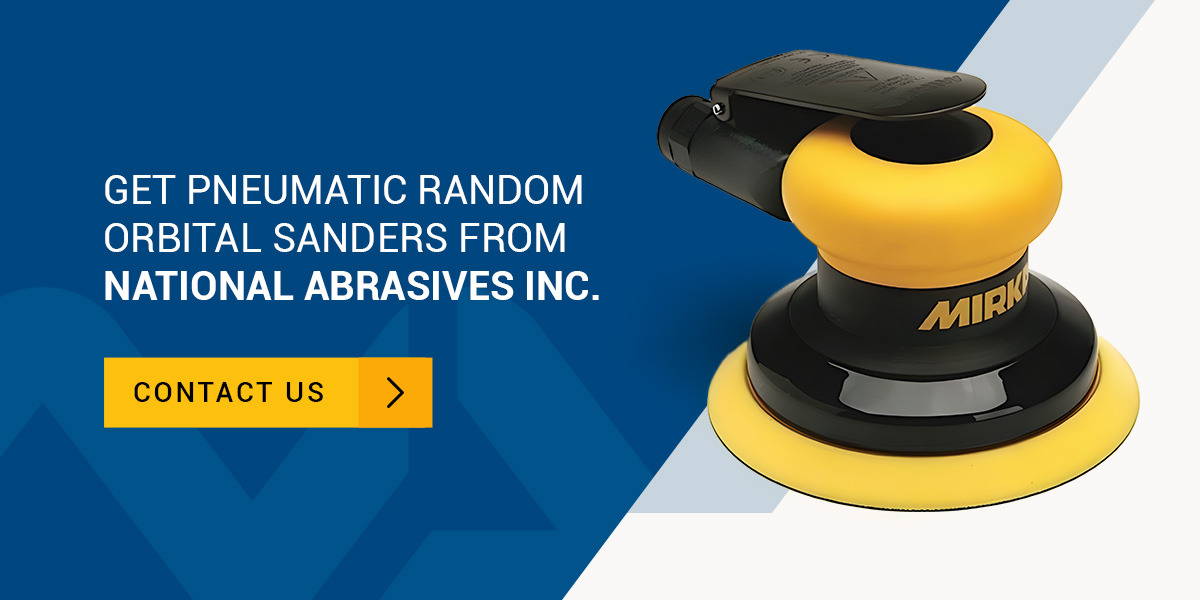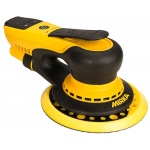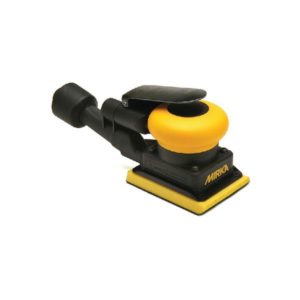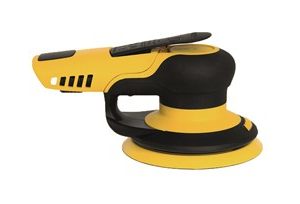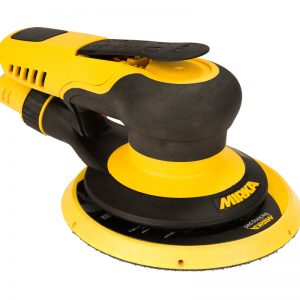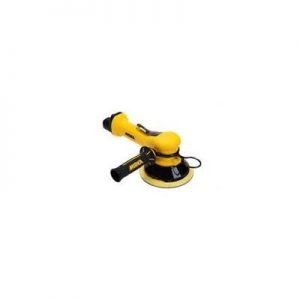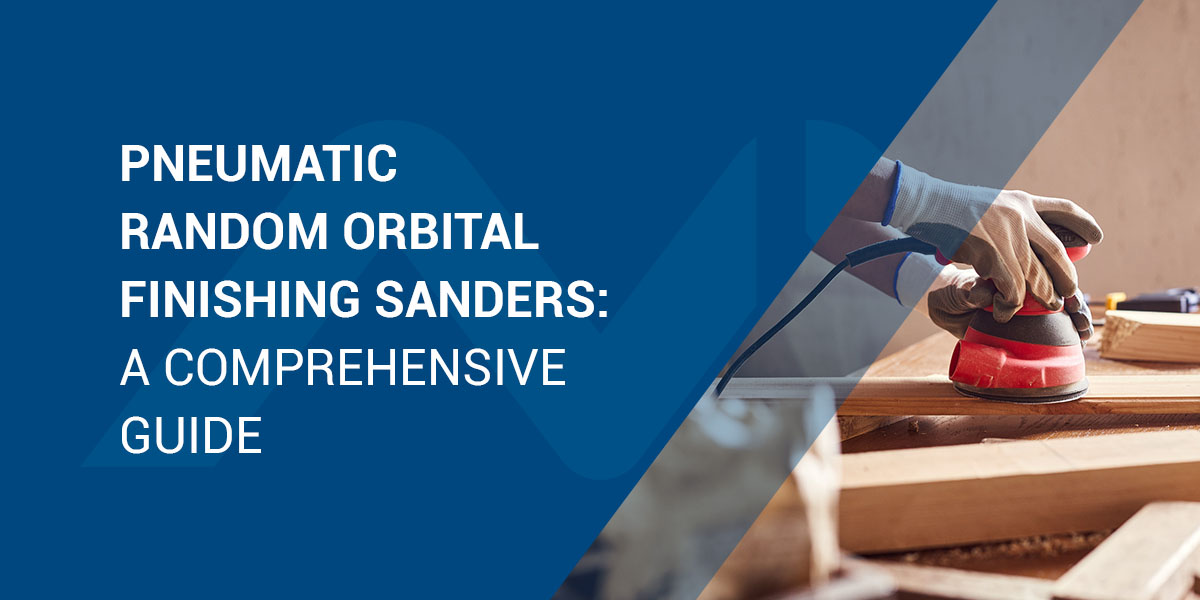
Pneumatic random orbital sanders are reliable and must-have tools in many woodworkers’ tool belts. They have sanding disks that spin in small, circular motions to create impeccably flat, smooth surfaces without swirl marks. Pneumatic sanders are lighter, quieter and easier to operate than electric sanders because they have an air compressor instead of a motor. They save you time, energy and money when used to remove old paint or varnish, buffer and polish wood and metal surfaces.
How Do Pneumatic Random Orbital Sanders Work?
Pneumatic random orbital sanders use air pressure generated by the air compressor inside to rotate sanding disks in an elliptical pattern. Most random orbital finishing sanders allow you to sand in any direction without damaging the wood, ensuring the surface is smooth and flat without swirl marks.
Constant airflow is necessary to prevent pneumatic sanders from varying power and speed during operation, which compromises their performance and makes them lose their orbital pattern. Some pneumatic finishing sanders offer multiple speed settings, so if you prefer the ability to alter functionality as you move from job to job, you should select a tool with this feature.
What Is the Difference Between Orbital Sanders and Random Orbital Sanders?
Although they sound similar, orbital sanders differ significantly from random orbital sanders. Orbital sanders vibrate in small circles, while random orbital sanders vibrate and rotate the sanding pad. This dual-action sanding helps create a smoother finish and means you’re less likely to leave obvious sanding patterns on your workpiece. Additionally, orbital sanders are typically square or rectangular and use standard sandpaper sheets. Random orbital sanders are round and generally use specialized hook-and-loop sheets of sandpaper.
What Is the Difference Between Pneumatic and Electric Random Orbital Sanders?
Pneumatic and electric random orbital sanders are power tools that make sanding fast and efficient. However, they have numerous distinct differences relating to:
- Weight and noise: The lack of a motor in pneumatic sanders makes them lighter and quieter than electric sanders, making for a more pleasant sanding experience. However, you need a huge air compressor to power your pneumatic sander.
- Cost: Pneumatic sanders are more affordable to purchase than electric sanders, especially if you already have an air compressor or access to high volumes of compressed air. However, in the long term, electric sanders are more affordable to power.
- Durability: Pneumatic sanders typically last longer than electric sanders because they have fewer components that are susceptible to damage.
- Portability: Electric sanders are easier to move around and transport than pneumatic sanders because you don’t need to drag a huge air compressor around. When you move to a new location, you only need to plug the electric sander into a socket or a battery.
- Dust collection: The main disadvantage of pneumatic sanders is that they do not come with dust collection attachments, while electric sanders often have a vacuum for efficient dust collection.
- Maintenance: Electric sanders are cheaper to maintain because no internal maintenance is required. However, pneumatic sanders require regular maintenance that accumulates costs, such as lubricating and changing air filters often, but they still outlive most electric sanders.

Benefits of Pneumatic Sanders
Pneumatic sanders are an excellent choice for many reasons. Here are some of the top benefits of owning a pneumatic sander:
- Gives a smooth and flat finish regardless of the direction of the wood grain.
- They have numerous applications, including cleaning up between coats, taking paint off old tables and chairs, or polishing metal countertops.
- Their light weight and compactness allow them to comfortably fit in one hand, ensuring smooth and precise handling.
- They are easy to use and suitable for use with woodworkers at all skill levels.
- Saves you money because of minimized disc consumption.
- These air-powered orbital sanders create safer working environments thanks to the reduced risk of short-circuiting and sparks.
- Available in different sizes with varying levels of functionality.
What to Look for When Buying a Random Orbital Sander?
When looking for the best sander for all your woodwork, the primary choice is between electric and pneumatic sanders. Pneumatic sanders are faster and more powerful than electric sanders. They are also lighter and quieter, but they do not include a dust collection attachment, which is present on many electric sanders.
While the upfront cost of pneumatic sanders is lower than electric costs, powering air orbital sanders is expensive. Electric sanders can be more versatile than pneumatic sanders because they come in triangular shapes that help you sand tight corners. They’re an ideal choice when you’re looking for a sanding tool you can easily move around with from site to site.
Other factors you’ll need to consider include the material you’ll be working with, the type of surface finish required and the extent of the job in question. You need a sander that allows you to achieve your preferred surface finish without aggressively chewing away through the material and leaving scuff marks. Other key features to consider when choosing a random orbital sander include:
- Sander speed: Random orbital sanders with variable-speed options ensure a smooth finish with more precise control.
- Sandpaper disc size: Sandpaper discs are available in 3-, 5- and 6-inch diameters. The best option depends on the size of the project and your preferred attachment style — hook-and-loop or glue.
- Sandpaper grit: The best random orbital finishing sanders come with 60- to 80-grit paper to ensure uniform and quality sanding. Fine 240-grit sandpaper is suitable for polishing a surface.
- Sander’s design: How a sander feels in your hand determines how much you get done. The best type of grip allows you to wrap your hands around the machine comfortably to reduce fatigue and vibration during long sanding sessions.
Get Pneumatic Random Orbital Sanders From National Abrasives Inc.
Are you looking for the best pneumatic random orbital finishing sanders? At National Abrasives, Inc., we sell the best-performing sanding equipment at prices that can’t be found elsewhere. Our inventory also includes sanding accessories, such as sanding discs, pads and belts for use with effective and reliable sanders.
We stock Mirka’s industry-leading line of pneumatic orbital sanders suitable for all professional operators. The Mirka pneumatic random orbital sanders are built for efficient sanding with maximum dust extraction even when operating at low function power. They also boast low noise levels when operating at maximum sanding speed.
To get more information about our pneumatic random orbital sanders for sale and to get matched with the best tools, contact our friendly staff today. Alternatively, explore our easy-to-use online store and order before 3 p.m. on weekdays to enjoy same-day shipping.

